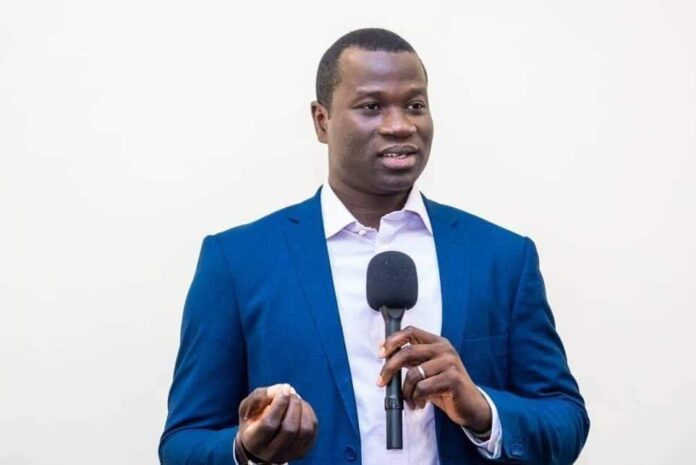By: The Fatu Network News Desk
The Minister of Youth and Sports, Bakary Y. Badjie, has responded to mounting criticism over the recent road accident involving The Gambia’s U-16 national basketball teams, clarifying that travel arrangements for international competitions are made solely by individual sports associations—not by his Ministry.
The boys’ and girls’ teams were travelling by bus to Guinea Conakry on Friday for the FIBA Africa Zone II Championship when their vehicle was involved in a crash. While no fatalities were reported, several players and staff sustained injuries. The government later chartered a private jet to bring the teams home, where they were received at Banjul International Airport by the Minister, basketball officials, and a medical team deployed to assess the injured.
Following the incident, public backlash quickly grew. Critics questioned why the teams had travelled by road, pointing to safety concerns and what many described as poor planning. In a statement released on social media, Minister Badjie rejected the notion that his Ministry was responsible for the travel decision. “Every sport association in the country manages its participation at international competitions and makes their own travel arrangements — not the Ministry,” he stated.
He emphasised that sports associations in The Gambia are not government bodies, but private institutions answerable to their members and stakeholders. According to the Minister, the Ministry’s role is limited to supervision, policy, and funding support, without involvement in operational logistics such as transport modes or itineraries. “We do not dictate the means of travel, nor is there any layer of approval for travel route or mode,” he added. “Most times, we at the Ministry get to know about an association’s impending travel when they write to the National Sports Council (NSC) requesting funding.”
Minister Badjie also addressed what he described as misinformation surrounding the Gambia Basketball Association’s (GBA) funding request. Some reports suggested the GBA initially submitted a D2 million dalasi budget for air travel, which the government declined. “That story is false,” he said. “The budget submitted to us from the NSC was D1.2 million dalasis. Upon review, the Ministry provided D1 million to the GBA. This essentially covered the entire cost as per their plan.”
He explained that the challenges of regional air travel—limited flights, long transits, and high prices—often lead associations to opt for road transport instead. “Air travel between our neighbouring countries is extremely difficult… This is why many associations, including those of sport, opt for road travels — and did so successfully in the past.”
Despite distancing the Ministry from direct responsibility, Minister Badjie acknowledged weaknesses in the current oversight system. He announced that a new National Sports Bill, finalised by the Attorney General’s Chambers, would soon be tabled before the National Assembly. The proposed legislation aims to strengthen regulatory authority and require associations to submit annual plans and seek approval before engaging in international competitions.
“We will take immediate actions to prepare enforceable regulations that will mandate sports associations to submit annual plans to the NSC,” he said. “This will help determine whether to approve or deny financial support and bar foreign travels when necessary.”
The Minister’s statement follows strong criticism from the Sports Journalists’ Association of The Gambia (SJAG), which labelled the road travel decision a “grave lapse in judgment.” “The use of a bus for such an international trip is unacceptable,” SJAG said. “We question why safer alternatives, such as air travel, were not prioritised, exposing our athletes to unnecessary risks.”
SJAG warned that the accident could set back the development of basketball in The Gambia. “Missing the qualifiers due to this avoidable tragedy will have a profound impact on both the boys’ and girls’ teams. This setback deprives them of a critical opportunity to showcase their talent, gain international experience, and advance their development.”
National Assembly Member for Banjul North, Hon. Modou Lamin B. Bah, also criticised the government and Ministry, questioning the fairness of subjecting young athletes to a risky journey. “If cabinet ministers would never take such a risky road trip, why was it acceptable for our youth team?” he asked. “If they could afford a private jet after the incident, why couldn’t they secure a commercial flight from the start?”
In contrast, Gambia Basketball Association President Ndongo Camara defended the travel decision. He said the teams have travelled by road many times before and insisted the players themselves preferred it. “The athletes prefer travelling by land. They enjoy it, as they get to explore more,” Camara stated.
While the players continue to recover, the episode has reignited a debate about the responsibilities of government versus sporting bodies, and the need for stronger safeguards when youth are sent to represent the country abroad. “Our national teams deserve better,” SJAG concluded. “The safety, well-being, and aspirations of our athletes must always come first.”




